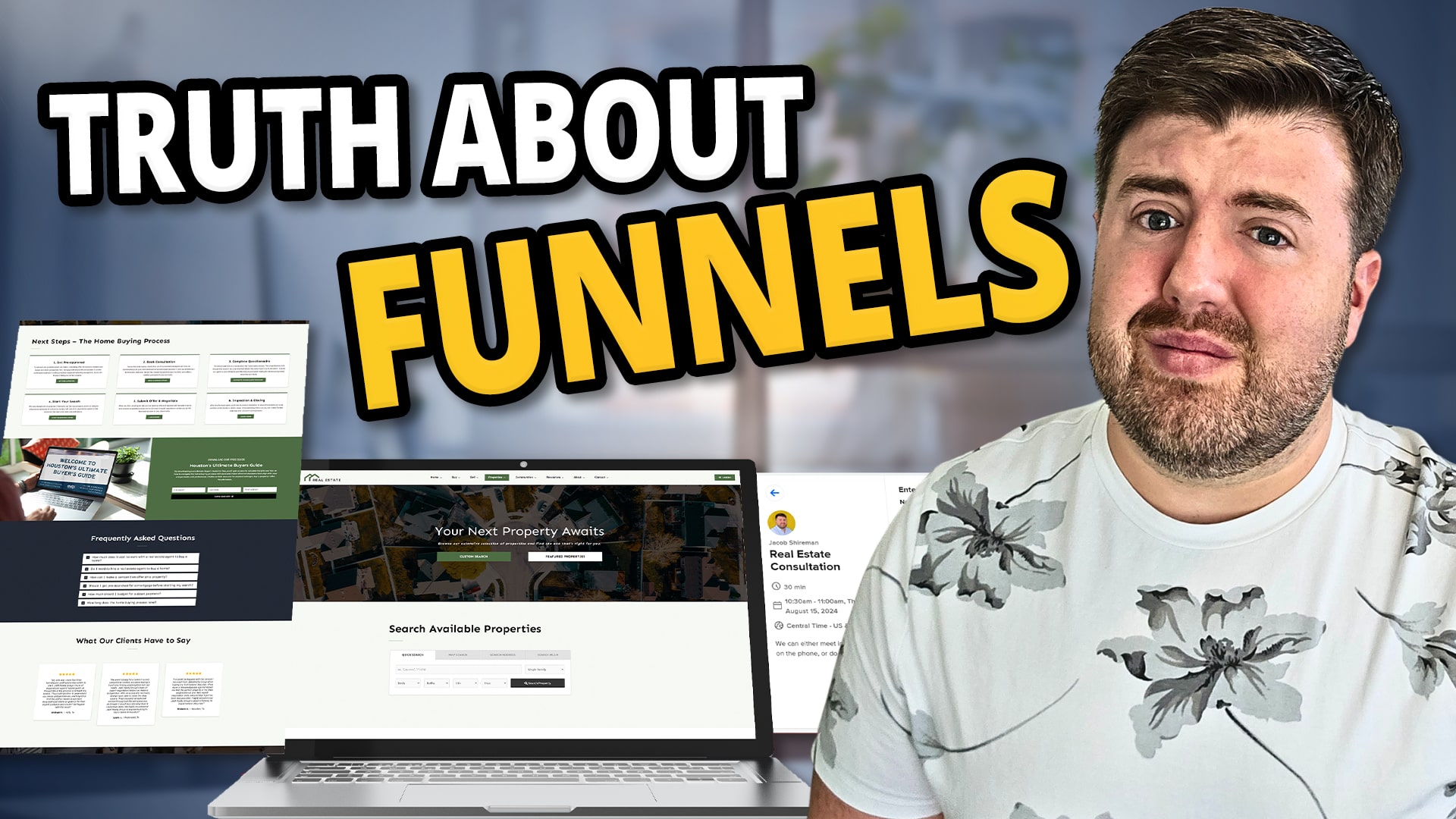Real Estate Funnels: What You Need to Know
Blog / Real Estate Funnels: What You Need to Know

The Truth About Real Estate Funnels: Essential Tips to Maximize Your Leads
In today’s real estate world, agents often fall victim to the allure of fancy tools and products marketed as game-changers. One of the most hyped tools is the sales funnel—a concept that’s successful in many industries, but often misunderstood in real estate.
In this article, I’ll break down what funnels are, how they work, and share better solutions for real estate lead generation.
If you would rather watch or listen to this content, check out the video!
Understanding Funnels: What Are They Really?
In today’s real estate world, agents often fall victim to the allure of fancy tools and products marketed as game-changers. One of the most hyped tools is the sales funnel—a concept that’s successful in many industries, but often misunderstood in real estate. In this article, I’ll break down what funnels are, how they work, and share better solutions for real estate lead generation.
Understanding Funnels: What Are They Really?
A funnel is simply a series of web pages designed to move visitors toward a specific action. Many funnels, like those created on platforms like ClickFunnels, focus on minimizing distractions. They remove menu options and unrelated links so that the visitor is only encouraged to take a specific action—whether buying a product, filling out a form, or signing up for a service.
In real estate, however, funnels need to be customized. Real estate funnels should focus on guiding potential clients through a series of steps: capturing their initial interest, nurturing them, and eventually converting them into clients ready to buy or sell.
Do Funnels Generate Leads?
A common misconception is that funnels themselves will generate traffic. Unlike websites that can be optimized for organic search traffic (SEO), funnels don’t drive traffic on their own. Traffic needs to be directed to a funnel via paid ads, social media, YouTube videos, or blog articles. Funnels excel in processing and converting leads, but they are not built to attract traffic organically.
For those focused on organic lead generation, an optimized website is critical, not just a stand-alone funnel. With the right SEO, a website can draw consistent traffic and provide multiple lead-capturing opportunities.
Funnels vs. IDX Websites: Dispelling Myths
Some claim that IDX websites are outdated, urging agents to rely solely on funnels. This is misleading. IDX (Internet Data Exchange) systems connect to the MLS, giving users a way to search property listings directly on your website. These listings are valuable because many prospective buyers start by browsing homes, even if they’re not ready to buy immediately.
If your website isn’t capturing leads effectively, the issue is usually with its design and functionality—not the IDX itself. Ensure your IDX is set up with registration prompts and consider multiple lead-capturing options. This way, you don’t miss out on clients at different stages of their journey, whether they’re browsing, preparing to buy, or ready to sell.
Solutions That Work: Integrating Funnels Into Your Real Estate Website
Instead of treating funnels as a separate tool, integrate them into a full website that’s designed for both traffic and lead processing. Here’s what an all-in-one website should include:
- Integrated IDX Search: IDX listings draw buyers interested in browsing homes. Make this an essential feature on your website and enable lead capture when users search properties.
- Custom Funnels for Different Client Needs: Have dedicated pages for buyers, sellers, new construction, and specific client groups like veterans or first-time homebuyers. Each page should be designed to guide visitors based on their needs.
- Landing Pages for Specific Offers: If you want to offer a home valuation or buyer’s guide, create landing pages. A simple form can capture lead information in exchange for valuable resources. Ensure that the email provided is real by sending the download link via email, which also weeds out less serious leads.
- Automated Follow-Ups and Lead Nurturing: Keep leads warm by automating follow-ups for those not ready to take action immediately. By keeping in touch, you stay top-of-mind until they’re ready to proceed.
- Personal Branding: Focus on branding that’s authentic to you. Rather than generic team names or stock images, use your name and real photos to create a connection with visitors. Show your face, highlight your experience, and convey how you solve clients’ problems.
Setting Up a Successful Real Estate Website
To illustrate, here’s a website framework I recommend:
- Main Funnels: Right on the homepage, direct visitors to relevant funnels: “Are You Looking to Buy?” or “Are You Looking to Sell?”
- Personal Branding Section: Include a brief intro about yourself as their trusted real estate advisor, along with testimonials and a featured listings section.
- Buyers and Sellers Funnels: Tailored funnels for buyers and sellers, including IDX search options, consultation booking, and buyer or seller guides.
- Portfolio and Testimonials: Include a feed that dynamically updates with client reviews and case studies to build credibility.
This kind of setup ensures that visitors are engaged based on their needs and seamlessly guided through the next steps, helping them progress toward becoming a client.
Optimizing Your Real Estate Business Website: Essential Tips from Jacob Shireman
Running a successful real estate business in today’s digital landscape means you need an effective, conversion-driven website. With so many options for web design and countless platforms vying for your attention, knowing what’s essential for your online presence can feel overwhelming. As a seasoned marketer and real estate professional, I’m here to share tips that can help you streamline your website to attract more clients and close more deals. So let’s dive in!
1. Crafting a Website That Converts
Your website is often the first point of contact for potential clients, so it needs to work well for you—without requiring endless tweaks or a massive budget. One of the biggest traps I see agents fall into is paying for fancy bells and whistles they don’t need, which may look impressive but don’t necessarily generate leads. The secret? Keep it simple and strategic.
Your website should include:
- Clear Contact Information: Clients need to know exactly how to reach you. Place your contact details in prominent areas, like the header or footer.
- Easy Navigation: Visitors should immediately know how to find property listings, contact forms, and other important pages.
- SEO Optimized Content: Use location-specific keywords to ensure your site shows up in search engine results, helping you attract local leads.
2. Avoiding Expensive Traps
Many companies offer high-priced solutions promising to deliver endless leads, but not all of them are worth the investment. Instead of jumping into an expensive contract, evaluate what you truly need. For many agents, a well-organized, user-friendly website and some SEO basics can make a huge difference. Remember, the goal isn’t to impress with a high-tech setup but to convert visitors into clients.
If you need guidance on what’s essential, book a free consultation with me. I’ll give you honest feedback on your site and let you know if a product or service isn’t necessary for your goals.
3. DIY Options and the Value of Partnering
Not all agents need to invest heavily in custom web development. There are effective DIY platforms that allow you to create a professional, responsive site on your own. In my partnership with eXp Realty, particularly with the Agent Wolf Pack, we offer agents access to resources like DIY website funnels and complete marketing systems at no extra cost. This support allows you to focus on building a robust, lead-generating site without the additional expense.
When you partner with me at eXp Realty, you get access to:
- Training and Resources: From web design basics to advanced marketing tactics, I provide courses and coaching to help you maximize your online presence.
- Customizable Website Funnels: With our DIY website funnel system, you can build a streamlined site that captures leads and supports your business growth.
- Ongoing Support: As part of the Agent Wolf Pack, you’ll have the support of a community dedicated to helping each other succeed in the real estate space.
Funnels can be valuable for real estate, but they aren’t the ultimate solution as many claim. Instead of relying solely on funnels, integrate them into a comprehensive website optimized for SEO, lead capture, and nurturing at each stage of a client’s journey.
By implementing the right structure and tools, you’ll avoid wasted costs on ineffective products and create a website that draws, engages, and converts leads effectively—growing your pipeline with clients for the long term.
I hope these insights help you cut through the noise and get a clear idea of what’s truly essential for a real estate website. Don’t fall into the trap of spending tons of money on things you don’t need. Instead, focus on building a strong foundation that draws clients to you naturally.
If you’d like personalized feedback or want to learn more about the benefits of joining eXp Realty, book a free 30-minute consultation with me. Whether you’re a solo agent, a team leader, or a broker owner, I’d love to show you how our partnership can elevate your business.
And if you found this content helpful, subscribe to my channel @jmshireman, like the videos, and hit the notification bell to stay updated with more tips for growing your real estate business.
Get access to the most elite-level training & resources to help you skyrocket production in any market condition.
Learn more about how to become a Modern Agent that drives more leads and closes more deals, and what my group is doing differently to empower agents that no one else is doing here at eXp Realty. Learn how to keep more of your money all while building a solid real estate business.
Based on 15 years of experience & client reviews

